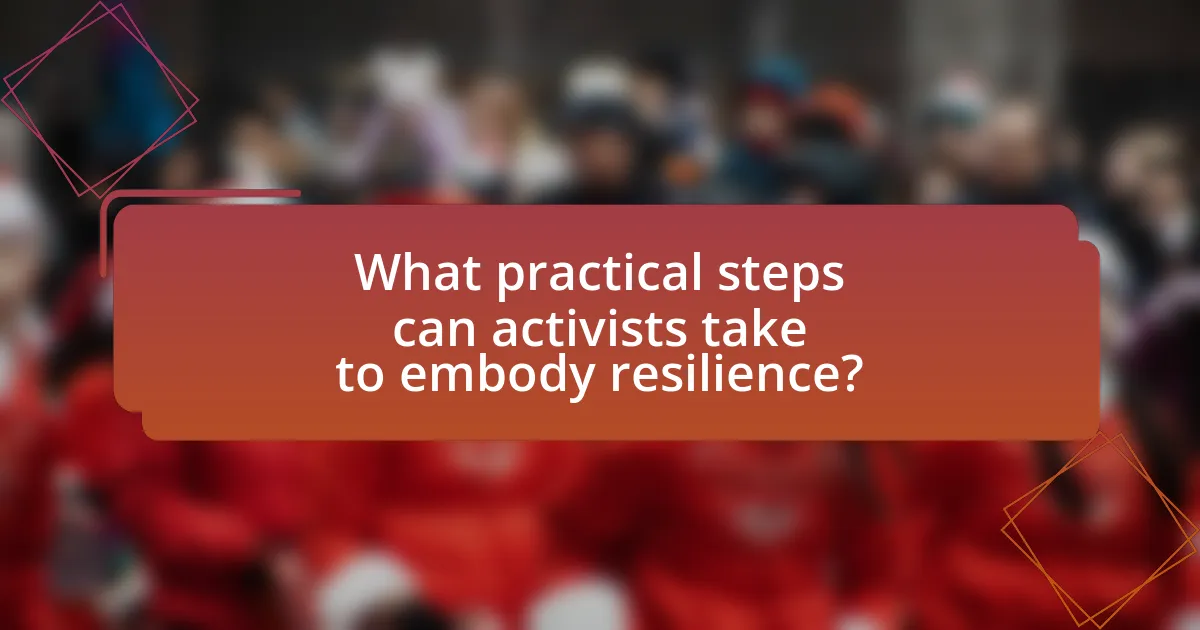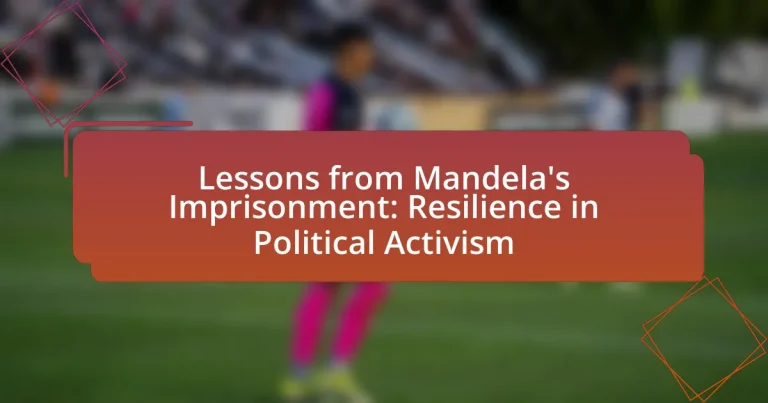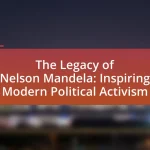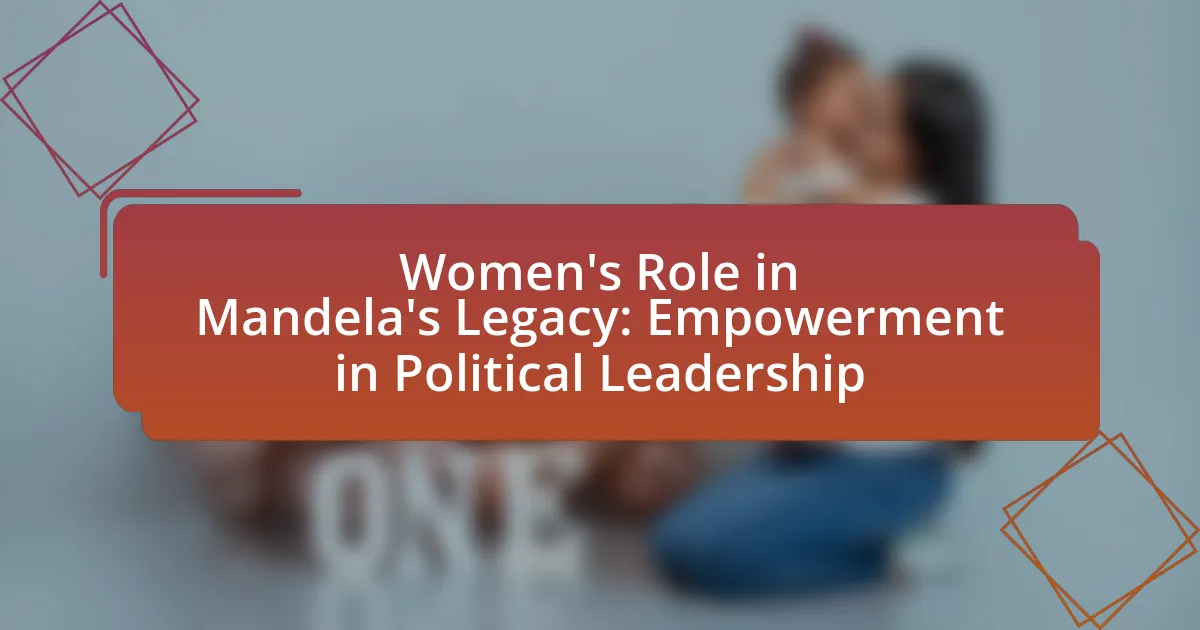The article focuses on the key lessons derived from Nelson Mandela’s imprisonment, emphasizing resilience, forgiveness, and commitment to justice. It explores how Mandela’s 27 years in prison shaped his views on resilience, highlighting specific experiences that contributed to his mental fortitude and leadership. The article also discusses the role of political activism during his incarceration, the evolution of his mindset towards negotiation and reconciliation, and how contemporary activists can apply Mandela’s principles to modern movements. Additionally, it addresses the challenges faced by today’s activists and offers practical strategies for cultivating resilience in political activism.
What are the key lessons from Mandela’s imprisonment?
The key lessons from Mandela’s imprisonment include the importance of resilience, the power of forgiveness, and the necessity of unwavering commitment to justice. Mandela’s 27 years in prison exemplified resilience as he maintained his principles and vision for a democratic South Africa despite harsh conditions. His ability to forgive his oppressors, as demonstrated in his later leadership, highlighted the transformative power of reconciliation in healing a divided nation. Furthermore, Mandela’s steadfast commitment to justice and equality, even in the face of personal sacrifice, serves as a powerful reminder of the impact of dedicated activism in the pursuit of human rights. These lessons are underscored by Mandela’s eventual success in leading South Africa out of apartheid, showcasing how perseverance and moral integrity can lead to significant societal change.
How did Mandela’s imprisonment shape his views on resilience?
Mandela’s imprisonment profoundly shaped his views on resilience by reinforcing his belief in the power of perseverance and hope in the face of adversity. During his 27 years in prison, Mandela experienced harsh conditions and isolation, which solidified his understanding that resilience is essential for overcoming challenges and achieving long-term goals. His ability to maintain a sense of purpose and commitment to the anti-apartheid struggle, despite the oppressive environment, exemplified his belief that resilience is not merely about enduring hardship but also about inspiring others to continue fighting for justice. This perspective was articulated in his autobiography, “Long Walk to Freedom,” where he emphasized that true resilience involves both personal strength and collective solidarity in the pursuit of freedom.
What specific experiences during imprisonment contributed to his resilience?
During his imprisonment, Nelson Mandela’s resilience was significantly shaped by his ability to maintain a strong sense of purpose and community among fellow inmates. The harsh conditions of Robben Island, including forced labor and limited communication, fostered a collective spirit among prisoners, which Mandela leveraged to cultivate solidarity and hope. Additionally, Mandela’s commitment to education and self-improvement during his incarceration, such as studying law and engaging in political discussions, reinforced his mental fortitude. These experiences not only helped him endure the physical and psychological challenges of imprisonment but also prepared him for leadership in the anti-apartheid movement upon his release.
How did Mandela’s mindset evolve while incarcerated?
Mandela’s mindset evolved from a focus on armed struggle to a commitment to negotiation and reconciliation while incarcerated. Initially, he believed that violence was necessary to combat apartheid, but over time, his experiences in prison led him to understand the importance of dialogue and compromise. This shift was influenced by his interactions with fellow inmates and the realization that a peaceful resolution was essential for South Africa’s future. Mandela’s transformation is evidenced by his later advocacy for forgiveness and unity, which played a crucial role in the peaceful transition to democracy in South Africa.
What role did political activism play during Mandela’s imprisonment?
Political activism played a crucial role in raising awareness and mobilizing international support for Nelson Mandela during his imprisonment. Activists organized campaigns, protests, and boycotts that highlighted the injustices of apartheid and demanded Mandela’s release, significantly increasing global pressure on the South African government. For instance, the Anti-Apartheid Movement in the UK and similar organizations worldwide worked tirelessly to keep Mandela’s plight in the public eye, leading to widespread condemnation of apartheid policies. This activism not only contributed to the eventual release of Mandela in 1990 but also laid the groundwork for the dismantling of apartheid, demonstrating the power of collective action in the face of oppression.
How did Mandela’s activism influence fellow prisoners?
Mandela’s activism significantly influenced fellow prisoners by fostering a sense of hope and unity among them. His leadership and commitment to the anti-apartheid struggle inspired inmates to maintain their dignity and resilience despite harsh conditions. Mandela organized discussions and educational sessions, which empowered prisoners to engage in political discourse and cultivate a collective identity. This approach not only uplifted their spirits but also strengthened their resolve to resist oppression, as evidenced by the solidarity and activism that emerged within the prison walls during his incarceration.
What strategies did Mandela employ to maintain political engagement?
Nelson Mandela employed several strategies to maintain political engagement during his imprisonment, primarily through communication, education, and fostering solidarity. He utilized letters to communicate with the outside world, which allowed him to share his thoughts and maintain connections with fellow activists and political leaders. Mandela also engaged in discussions with prison authorities, advocating for better conditions and using these interactions to promote his political ideals. Furthermore, he emphasized the importance of education, both for himself and for others, by studying various subjects and encouraging fellow inmates to do the same, thereby fostering a sense of purpose and unity. These strategies were effective in keeping the anti-apartheid movement alive and relevant, as evidenced by the continued support for his cause during his 27 years of incarceration.
How can we apply Mandela’s lessons to modern political activism?
Mandela’s lessons can be applied to modern political activism by emphasizing resilience, forgiveness, and the importance of dialogue. Resilience is crucial as Mandela demonstrated through his 27 years of imprisonment, showing that enduring hardship can strengthen a movement. His commitment to forgiveness, even towards oppressors, highlights the power of reconciliation in building a united front for change. Additionally, Mandela’s focus on dialogue underscores the necessity of engaging with diverse perspectives to foster understanding and collaboration. These principles are evident in contemporary movements, such as the Black Lives Matter movement, which advocates for justice while promoting dialogue and community engagement.
What are the contemporary challenges faced by political activists?
Contemporary challenges faced by political activists include government repression, misinformation, and digital surveillance. Government repression manifests through laws that restrict freedom of assembly and speech, as seen in countries like Belarus, where protests against the regime are met with violent crackdowns. Misinformation campaigns, often amplified by social media, undermine activists’ messages and create public confusion, as evidenced by the spread of false narratives during electoral processes in various democracies. Additionally, digital surveillance poses a significant threat, as activists are increasingly monitored online, which can lead to harassment or arrest, highlighted by reports from organizations like Amnesty International detailing the use of technology to track dissenters.
How can resilience be cultivated in today’s political climate?
Resilience can be cultivated in today’s political climate through community engagement, education, and adaptive strategies. Community engagement fosters solidarity and support networks, which are essential for individuals facing political challenges. Education empowers individuals with critical thinking skills, enabling them to navigate misinformation and develop informed opinions. Adaptive strategies, such as mindfulness and stress management techniques, help individuals cope with political stressors. Research indicates that social support and education significantly enhance resilience, as demonstrated in studies by the American Psychological Association, which highlight the importance of community and knowledge in overcoming adversity.
What lessons from Mandela can guide current activists?
Current activists can learn the importance of resilience and forgiveness from Nelson Mandela’s life and activism. Mandela demonstrated that enduring hardship, such as his 27 years in prison, can strengthen one’s resolve and commitment to justice. His ability to forgive his oppressors and advocate for reconciliation rather than revenge illustrates the power of unity in achieving social change. Mandela’s leadership during the transition from apartheid to democracy in South Africa serves as a concrete example of how patience and strategic negotiation can lead to transformative outcomes, emphasizing that lasting change often requires time and perseverance.
How does Mandela’s legacy inspire future generations of activists?
Mandela’s legacy inspires future generations of activists by exemplifying resilience, moral integrity, and the power of peaceful resistance. His 27 years of imprisonment for fighting against apartheid demonstrated an unwavering commitment to justice, which motivates activists to endure hardships in pursuit of their causes. Mandela’s ability to unite diverse groups under a common goal of equality and reconciliation serves as a blueprint for contemporary movements, emphasizing the importance of inclusivity and dialogue. His leadership during South Africa’s transition from apartheid to democracy illustrates that sustained activism can lead to significant societal change, encouraging new activists to believe in the possibility of transformation through persistent effort and nonviolent means.
What stories of resilience can be drawn from Mandela’s life?
Nelson Mandela’s life exemplifies resilience through his unwavering commitment to fighting apartheid despite enduring 27 years of imprisonment. During his incarceration, Mandela maintained his resolve by engaging in negotiations with fellow inmates and prison authorities, which ultimately laid the groundwork for the end of apartheid. His ability to transform personal suffering into a powerful message of hope and reconciliation is evident in his leadership style, which emphasized forgiveness over vengeance. Mandela’s release in 1990 marked a pivotal moment in South African history, showcasing his resilience as he transitioned from prisoner to president, advocating for peace and unity in a divided nation. His journey illustrates that resilience can lead to profound societal change, as evidenced by his role in establishing a democratic South Africa.
How can Mandela’s principles be integrated into modern movements?
Mandela’s principles can be integrated into modern movements by emphasizing reconciliation, inclusivity, and non-violent resistance. These principles encourage activists to seek dialogue and understanding rather than division, as demonstrated by Mandela’s efforts to unite South Africa post-apartheid. For instance, the Truth and Reconciliation Commission established in 1995 exemplifies how addressing past injustices through dialogue can foster healing and progress. Additionally, modern movements can adopt Mandela’s commitment to equality and justice, advocating for marginalized voices and ensuring diverse representation, which aligns with his belief in collective action for social change. By applying these principles, contemporary activists can create more effective and sustainable movements that resonate with Mandela’s legacy of resilience and hope.

What practical steps can activists take to embody resilience?
Activists can embody resilience by developing strong support networks, practicing self-care, and maintaining a clear vision of their goals. Strong support networks provide emotional and practical assistance, which is crucial during challenging times; for example, community groups often share resources and strategies that enhance collective strength. Practicing self-care, including mental health awareness and physical well-being, helps activists sustain their energy and focus, as evidenced by studies showing that burnout can significantly hinder activism effectiveness. Lastly, maintaining a clear vision of goals allows activists to stay motivated and adaptable, as seen in historical movements where leaders like Nelson Mandela emphasized the importance of a long-term vision to navigate adversity.
What strategies can enhance resilience in political activism?
Strategies that can enhance resilience in political activism include building strong community networks, fostering emotional intelligence, and maintaining a long-term vision. Strong community networks provide support and resources, which are essential during challenging times; for example, the anti-apartheid movement in South Africa thrived on solidarity among activists. Fostering emotional intelligence helps activists manage stress and navigate conflicts effectively, as seen in the leadership styles of figures like Nelson Mandela, who emphasized empathy and understanding. Maintaining a long-term vision ensures that activists remain focused on their goals despite setbacks, as evidenced by the sustained efforts of civil rights movements that ultimately led to significant legislative changes.
How can activists build supportive communities?
Activists can build supportive communities by fostering inclusive spaces that encourage dialogue and collaboration. Creating platforms for open communication allows individuals to share experiences and resources, which strengthens community bonds. Research indicates that community engagement initiatives, such as local workshops and forums, enhance social cohesion and collective action, as seen in the successful anti-apartheid movements led by Nelson Mandela and others. These movements thrived on solidarity and mutual support, demonstrating that shared goals and collective resilience are essential for sustaining activist communities.
What role does self-care play in sustaining activism?
Self-care is essential for sustaining activism as it helps maintain the physical, emotional, and mental well-being of activists. When individuals engage in self-care practices, they are better equipped to handle the stresses and challenges associated with activism, which can often lead to burnout. Research indicates that activists who prioritize self-care report higher levels of resilience and effectiveness in their efforts, as they can sustain their energy and motivation over time. For instance, a study published in the Journal of Community Psychology highlights that self-care strategies, such as mindfulness and physical exercise, significantly reduce stress and enhance the capacity for long-term commitment to social causes. Thus, self-care not only supports individual activists but also strengthens the overall movement by ensuring that its members remain engaged and effective.
How can lessons from Mandela’s imprisonment inform personal growth?
Lessons from Mandela’s imprisonment can inform personal growth by illustrating the importance of resilience, patience, and the power of a strong moral compass. Mandela endured 27 years of incarceration, which taught him to cultivate inner strength and maintain hope despite adversity. His ability to remain focused on his goals, even in the face of extreme hardship, exemplifies how perseverance can lead to personal development. Furthermore, Mandela’s commitment to forgiveness and reconciliation after his release highlights the significance of emotional intelligence and empathy in personal growth. These lessons emphasize that enduring challenges can foster resilience and lead to a deeper understanding of oneself and others.
What mindset shifts are necessary for resilience in activism?
Resilience in activism requires a mindset shift from viewing setbacks as failures to seeing them as opportunities for growth. Activists must embrace a long-term perspective, understanding that change often takes time and persistence. This shift is supported by historical examples, such as Nelson Mandela, who spent 27 years in prison yet emerged with a commitment to reconciliation and social justice, demonstrating that enduring hardship can strengthen resolve and clarify purpose. Additionally, cultivating a sense of community and collaboration among activists fosters emotional support, which is crucial for maintaining motivation and resilience in the face of challenges.
How can individuals learn from setbacks in their activism journey?
Individuals can learn from setbacks in their activism journey by analyzing the reasons for their failures and adapting their strategies accordingly. For instance, setbacks can provide critical insights into the effectiveness of their methods, the needs of the community, and the political landscape. Historical examples, such as Nelson Mandela’s imprisonment, illustrate that enduring challenges can strengthen resolve and clarify goals. Mandela’s experience showed that setbacks can foster resilience, leading to more strategic and impactful activism in the long run.




